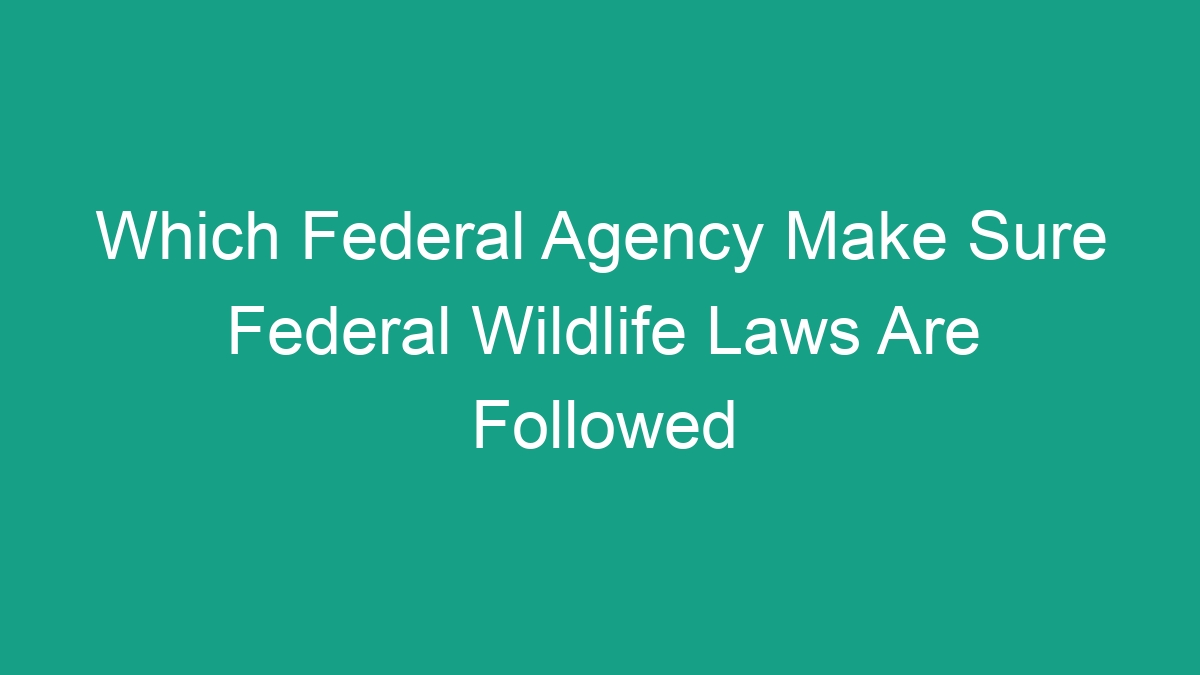
In the United States, there are numerous laws and regulations in place to protect the country’s diverse wildlife and ensure their well-being. These laws are enforced and overseen by various federal agencies, each with its own specific responsibilities. In this article, we will explore which federal agency makes sure federal wildlife laws are followed and how they carry out this crucial task.
U.S. Fish and Wildlife Service
The primary federal agency responsible for enforcing and overseeing federal wildlife laws in the United States is the U.S. Fish and Wildlife Service (USFWS). The USFWS is a bureau within the U.S. Department of the Interior and is tasked with the conservation, protection, and enhancement of fish, wildlife, and plants and their habitats.
One of the key laws that the USFWS enforces is the Endangered Species Act (ESA). This landmark legislation provides for the conservation of species that are endangered or threatened with extinction, as well as the conservation of the ecosystems on which they depend. The USFWS is responsible for listing species as endangered or threatened, designating critical habitat for these species, and developing and implementing recovery plans.
In addition to the ESA, the USFWS also enforces a wide range of other federal wildlife laws, including the Migratory Bird Treaty Act, the Marine Mammal Protection Act, the Bald and Golden Eagle Protection Act, and the Lacey Act. These laws protect a diverse array of wildlife, from migratory birds and marine mammals to eagles and other protected species.
National Oceanic and Atmospheric Administration
Another federal agency that plays a critical role in enforcing federal wildlife laws is the National Oceanic and Atmospheric Administration (NOAA). NOAA is responsible for the stewardship of the nation’s marine resources and the protection of the marine environment.
One of the most significant laws enforced by NOAA is the Marine Mammal Protection Act (MMPA). This legislation prohibits the taking of marine mammals in U.S. waters and by U.S. citizens on the high seas, as well as the importation of marine mammals and marine mammal products into the United States.
Additionally, NOAA is tasked with enforcing the Endangered Species Act as it pertains to marine species, such as sea turtles, marine mammals, and certain fish species. The agency works to protect and conserve these species and their habitats, particularly in the marine environment.
U.S. Forest Service
The U.S. Forest Service, an agency within the U.S. Department of Agriculture, also plays a role in enforcing federal wildlife laws, particularly as they relate to wildlife and habitats on national forests and grasslands. The agency is responsible for managing and conserving these public lands and ensuring that wildlife laws are followed within their boundaries.
The U.S. Forest Service works to protect and enhance wildlife habitat, conserve threatened and endangered species, and manage the impacts of human activities on wildlife. The agency also collaborates with other federal, state, and local agencies, as well as private landowners and conservation organizations, to achieve these goals.
U.S. Department of Justice
While the aforementioned agencies are primarily responsible for enforcing and overseeing federal wildlife laws, the U.S. Department of Justice also plays a crucial role in this process. The Department of Justice is responsible for prosecuting individuals and entities that violate federal wildlife laws and regulations.
The Department of Justice works closely with the other federal agencies mentioned in this article, as well as with state and local law enforcement agencies, to investigate and prosecute wildlife crimes. These crimes can include illegal hunting, fishing, poaching, trade in protected species and their parts, and other violations of wildlife laws.
Collaboration and Partnerships
Enforcing federal wildlife laws is a complex and multi-faceted task that requires collaboration and partnerships among various federal, state, and local agencies, as well as with non-governmental organizations and the public. Many wildlife laws are implemented through cooperative efforts involving multiple agencies and stakeholders, reflecting the interconnectedness and interdependence of the natural world.
The U.S. Fish and Wildlife Service, National Oceanic and Atmospheric Administration, U.S. Forest Service, and U.S. Department of Justice work together to address various wildlife conservation and enforcement challenges. These collaborations often involve sharing information and resources, coordinating enforcement actions, and developing and implementing conservation strategies.
Challenges and Future Directions
Enforcing federal wildlife laws comes with various challenges, including limited resources, human-wildlife conflicts, habitat loss and degradation, climate change, and emerging threats such as wildlife trafficking and invasive species. Addressing these challenges requires ongoing efforts to strengthen and improve wildlife law enforcement and conservation measures.
Moving forward, there is a growing recognition of the importance of integrating wildlife law enforcement with broader conservation and sustainability initiatives. This includes promoting a holistic approach to wildlife management that considers ecological, social, and economic factors, as well as engaging with local communities and indigenous peoples in wildlife protection efforts.
Furthermore, technological advances, such as the use of remote sensing, DNA analysis, and digital communication tools, offer new opportunities to monitor and enforce wildlife laws. These innovations can enhance the effectiveness and efficiency of wildlife law enforcement and contribute to the protection of wildlife and their habitats.
In conclusion, the enforcement and oversight of federal wildlife laws in the United States involve multiple federal agencies, including the U.S. Fish and Wildlife Service, National Oceanic and Atmospheric Administration, U.S. Forest Service, and U.S. Department of Justice. These agencies play critical roles in protecting and conserving the nation’s diverse wildlife and ensuring that federal wildlife laws are followed. Through collaboration, partnerships, and innovation, these agencies are working to address current challenges and shape the future of wildlife conservation and law enforcement.



